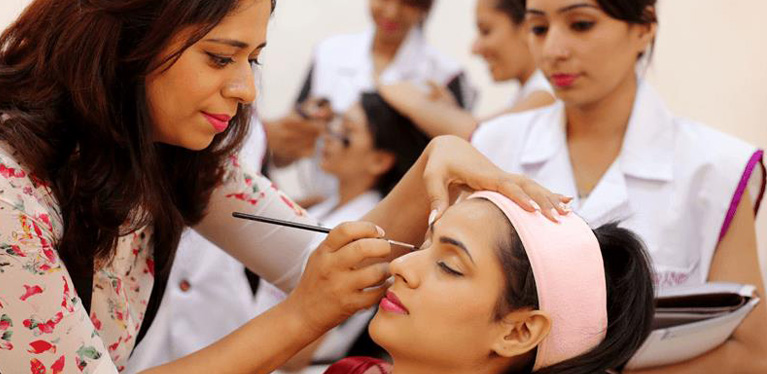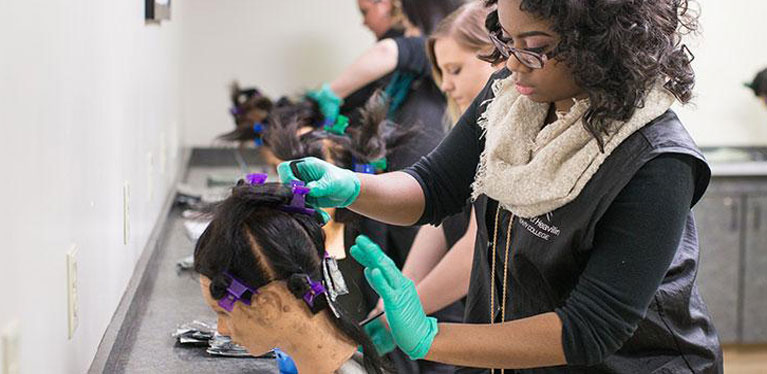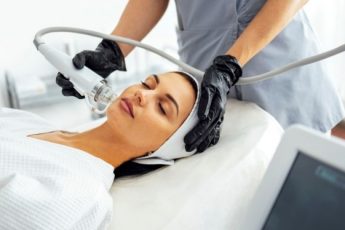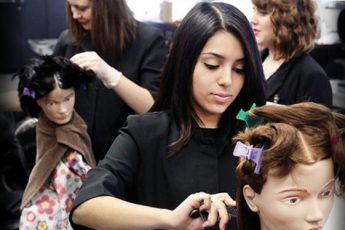The basic prerequisite to become a cosmetologist is to pursue a professional cosmetology course from a reputed beauty training academy. From basic to advance, a course in cosmetology includes everything that should be at the fingertips of a cosmetologist. By enrolling for the course, a student gets to study topics like keratin treatment, facial and advanced skin treatments, hair colouring techniques, pedicure and manicure, etc. On an average, the cosmetology school course curriculum all over the world includes the following fundamentals:
General Cosmetology
This course introduces a person to the whole concept of cosmetology. You can learn human anatomy and physiology, hygiene and sanitation, basic and advanced cosmetology tools and equipment (electronic and otherwise). It also introduces you to the psychological aspect of your clients through basic patient ethics and personal grooming. You can understand your clients’ skin and hair types, requirements, and deliver services accordingly.
Hair Care
Hair is every woman’s pride as well as her worry. It indeed is her crowning glory, and can you make you look pretty. But a bad hair day can simply ruin your look too.
Hair care, styling, cutting are essential aspects of cosmetology. The course introduces you to different hair types, hair problems and its subsequent treatments. Hair and scalp treatments vary based on their types. And, a certified cosmetologist can only offer the right treatment after analyzing the underlying problems.
As a student, you will learn various methods of shampooing, conditioning, and essential hair care treatments like spa, keratin, and smoothing. You can even get to learn the specialties of hairstyling like trimming, thinning, curling, cutting, and shaping techniques.
Hair cutting and colouring
An advance course in cosmetology introduces you to hair colouring techniques. However, hair cutting generally is a part of basic cosmetology course. You can learn detail types of hair colouring like touch ups, global, highlights, ombre etc. Colouring techniques and application are taught by experts at any reputed beauty school. Various types of hair styling like braids, buns, updos, crimps, and curls are also taught in the course. You also get to study details on wigs, artificial hair, and hair accessories.
Nail care
Nail care is one of the most important topics covered in cosmetology course curriculum. Curing nail disorders, diseases, infections, and beautifying nails are some of the major topics taught. It also include the study of manicure and pedicure. Only a professional cosmetologist with sound knowledge can do manicure and pedicure with utmost care and perfection.

Picture credit: https://www.ucs.edu/perks-of-working-in-the-beauty-industry/
Skin care
You will get to learn various skin types and how to offer skin treatments based on the same. Rewarding your client with radiant and beautiful skin is the biggest challenge and only a cosmetology course can help you ace it. Join advanced cosmetology course in a reputed beauty academy like Lakmé Academyand get trained on skin types and treatments from the experts.

Picture credit: https://www.oranebeautyinstitute.com/find-a-course/
Makeup application
The art of applying makeup is an essential technique, so that the face does not look caked up. Beauty schools teach you makeup types and application. Makeup types and application is also included in cosmetology course curriculum. So join the course and get trained on makeup tools, types, application, tips, and aesthetics.
Facial and face treatments
Face care is not an easy task and only a professional cosmetologist can do it with perfection. Learn the technique of cleansing, massaging, facial hair removal and mask application, applying pressure on the right points and delivering a complete facial service.
Salon management
Cosmetology schools provide training on building strong client relations, business ethics, and brand reputation. Effective marketing techniques, business labor laws, and workers’ compensation rights are also some topics covered in a cosmetology course. You also can get knowledge regarding financial assistance, such as loans to set up your salon.


















Our Courses: